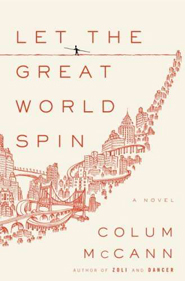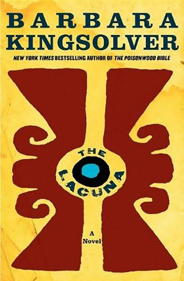-
March 29, 2010
Semifinals
-
Commentary by
Kevin Guilfoile & John Warner
-
Today’s Winner:
1The Lacuna
Kevin: Even though this match pitted a no. 1 seed versus another no. 1, and the result was, in retrospect, about as surprising as Andrew Bird breaking into a whistling solo, I’m calling this the biggest upset of the tourney so far. I think many of us (you, me, various commenters, and tweepelones) thought Let the Great World Spin was the favorite. It is both ambitious and accessible, a characteristic possessed by many past Rooster winners (Cloud Atlas, Junot Diaz, The Road, etc.). You and I both had it at no. 1 in our confidence rankings even if it wasn’t our absolute favorite book in the tourney. It seems most everybody who reads it, likes it at least a little bit.
And there’s the thing.
I think readers were generally more passionate about The Lacuna, one way or the other. You really didn’t like it. Others loved it. So what deserves a book award more, the book that is loved most passionately by some (and disliked just as passionately by others) or the book that everybody can agree upon, the book everyone likes but not so many people love?
The latter is the kind that wins most book awards, I think—awards that are arrived at by consensus and compromise, usually behind closed doors. The Rooster is another animal.
John: This is more surprising to me than the Democrats getting it together and passing healthcare legislation. OK, maybe not quite that surprising, but I had The Lacuna ranked third from the bottom in my confidence pool, and here it is, just needing to put down a Zombie in order to make it to the Championship.
I’ve been trying to go back and reconstruct my rationale for why I had so little confidence in The Lacuna. Part of it is that it was paired up against my favorite book in the tourney, Fever Chart, which is my emotional favorite. To pick against Fever Chart would be like filling out an N.C.A.A. basketball tourney and not picking my alma mater (the University of Illinois, which didn’t even make the tournament this year) to reach the Final Four, which I would not do because that would be a jinx and I couldn’t live with the guilt if my picking against my team was what caused them to not win the National Championship.
In hindsight, my ranking is ludicrous, irrational, particularly considering Kingsolver’s track record, the generally positive to glowing reviews for The Lacuna, not to mention the fact that it was recently announced as a finalist for the PEN/Faulkner award. So yeah, obviously a first novel by an independent press is going to take it out in the first round. My stupid shortsightedness is probably going to cost me exactly one giant wheel of delicious stinky cheese.
Consensus is a great tool for solving a complex problem, but I’m not convinced it’s an effective way tool for either choosing prizewinning books, or as an operating method for the publishing industry in general since consensus often involves compromise, and compromise is the enemy of passion. We’ve talked quite a bit this Tournament of how unique the appeal of each book is, that every book, even many bestsellers, are essentially tiny niche products. Since books can’t be effectively mass-marketed, the only way they succeed is to find some critical mass of passionate fans to spread the word. The greater the passion, the more likely a person is going to press the book on others. Publishers with editorial boards, or where sales and marketing have to weigh in on a potential title with the power to say “no,” points toward a consensus mode of selection—choosing to publish works that don’t raise objections, as opposed to those that inflame passions.
When a book prize comes from a jury, as most do, almost always the winning book will win because it is acceptable to everybody. In an essay collected in Finding a Form, William Gass said of the Pulitzers:
This is not to say that Let the Great World Spin isn’t a good book. It’s very good. But a lot like last year’s National Book Award winner, Shadow Country, I admired it more than I loved it, and when a book that’s admired goes up against one that’s loved, no amount of prestige, scope, or vision is going to overcome that feeling.The Pulitzer Prize in fiction takes dead aim at mediocrity and almost never misses; the prize is simply not given to work of the first rank, rarely even to the second; and if you believed yourself to be a writer of that eminence, you are now assured of being over the hill—not a sturdy mountain flower but a little wilted lily of the valley.
Next year, I’m going to be a lot smarter about all this.
Kevin: This might be a good time to revisit the fact that we have never made the claim that these are the best 16 books of the year. The way the books are chosen is more arbitrary that the rhyming words in a McCartney-Wonder duet (“ivory” and “harmony,” whaat?). That’s part of the point. But like any good contest of this sort, half the fun is complaining about/championing the books that didn’t make it. Over at Wet Asphalt they have a handful of pundits weighing in on books they think should have made the shortlist (and many of them are ones we considered). They are good lists, and if you’re looking for reads from last year, you should check them out for more suggestions. Of course, the fact that Ed Champion nominates more than 16 books all by himself highlights both the fun and the futility of such a debate. As we said in the introduction, there are hundreds of novels that could have made the final 16; these just happen to be the ones that did.
And, as an active member of both the Mystery Writers of America and International Thriller Writers, I reject the assumption that we are either “ignorant” about or “prejudiced” against genre. This year we had Margaret Atwood, Victor LaValle, and a comic book. Last year we had Laura Lippman. Heck, my own novels are usually labeled as both “Crime” and “Science Fiction.” I’m a one-man, double-dipping, cross-genre flag waver.
But they really should put me on the psychics and tarot shelf because after this match I retake the lead in our confidence pool by the narrowest margin: 174-169. And in our pre-Tournament poll, Let The Great World Spin did receive enough votes to make the top four among Zombie contenders, bumping A Gate at the Stairs from the list. So with just one match to go before the Zombie Round, the potential undeads are:
- Everything Ravaged, Everything Burned
- Fever Chart
- Let the Great World Spin
- Miles From Nowhere
Kevin Guilfoile is a contributing writer for TMN. His debut novel, Cast of Shadows, has been translated into more than 17 languages, and his second novel, The Thousand, will be published in August 2010 by Alfred A. Knopf.
John Warner is a contributing writer for TMN. He is the author of Fondling Your Muse: Infallible Advice From a Published Author to the Writerly Aspirant. He teaches at Clemson University.

















